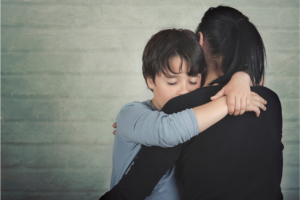
What To Do When Co-Parenting Doesn’t Work
When co-parenting doesn’t work, you can still raise happy, healthy children post-divorce.
When a divorce involves children, the most important considerations necessarily revolve around them. When co-parenting doesn’t work as a custodial solution, the priority of the children must still be maintained.
Given that children need and deserve to have a relationship with both parents, it makes sense that co-parenting would be the ideal arrangement. In a healthy co-parenting arrangement, the children, not the parents, are the focus.
Co-parenting expects parents to essentially “be on their best behavior” and practice healthy co-parenting. They have to communicate regularly, agree on fundamental child-rearing strategies and rules, and put the needs of the kids above their own.
As idyllic an arrangement as that sounds — short of being happily married — it’s not always possible.
Some couples simply aren’t ready or able to rise above their lingering negative emotions like anger, resentment and jealousy. Sometimes parenting philosophies and behaviors are starkly different. (Perhaps those differences even played a role in the divorce.) And sometimes two people are just flat-out incapable of collaboration.
Research shows that it’s not divorce itself that causes lasting harm to children. It’s being an audience to their parents’ destructive fighting that harms them. And that’s true whether their parents are married or divorced.
The damage affects the emotional, physical and social dimensions of the kids’ lives. And it follows them into adulthood, often thwarting their ability to have healthy relationships of their own.
What are your choices, then, when co-parenting doesn’t work and sole custody is out of the question? Is equal parenting still possible, but in a different way? And is it possible for your children to have an equal relationship with both parents without you and your ex having to interact?
When co-parenting doesn’t work because the risk of conflict is just too great, parenting has to be done without engaging. And, while that may not be the ideal parenting method, it is possible.
In parallel parenting, exes parent by disengaging. The goal is to reduce conflict and move forward with their lives while supporting their children’s right to relationships with both parents.
Children do better emotionally, psychologically, behaviorally and academically when they have positive bonds with both parents. When co-parenting doesn’t work because parents can’t communicate healthily, parallel parenting offers a way for kids to still have those essential bonds.
An often overlooked influence on the quality of parent-child attachments is the well-being of the parents. When a parent is threatened with the loss of his/her children, the risk of depression skyrockets for him/her. Finding a way to facilitate equal parenting benefits the well-being of both parents, which in turn benefits their relationships with their children.
Although parents in a parallel-parenting arrangement disengage from one another, they remain fully engaged with their children. They usually agree on major decisions regarding the upbringing of the children, but that’s it. They separately decide the day-to-day logistics, decisions and rules for the kids.
Because parallel parenting is predicated on disengagement, all communication between the parents is kept non-personal and business-like. All information shared is related to the kids, though the kids are never to be used as messengers.
In co-parenting, exes communicate openly and regularly — by phone, text, email and even face-to-face. In parallel parenting, the non-personal nature of the arrangement mandates a more contractual approach. Changes require a written agreement, and schedules are shared via a calendar or in writing.
The key to successful parallel parenting is letting go of trying to control the other parent.
That means not imposing your own expectations for rules and behaviors. If your ex allows playtime before homework, it’s essentially none of your business. You run your home your way, your ex runs his/her home his/her way.
The whole purpose of non-interference is fostering your children’s unrestricted ability to have a relationship with both parents. Even if you can’t prioritize your children by co-parenting, you can still prioritize them by not interfering when they are with your ex.
If you are more familiar with other custodial arrangements like co-parenting or primary guardianship, parallel parenting may sound cold. But remember that the motivation is to reduce stress, especially for the children. And equal-parenting arrangements lead to less stress and conflict than sole- or primary-custody arrangements.
This arrangement isn’t without its challenges, however. One of the downfalls is that frequent shifts between homes is tough on small kids. And older kids want more flexibility and independence, which can make a rigid, contractual arrangement difficult.
Logistically, a high degree of specificity is necessary in the initial plan. And the higher the conflict level between parents, the greater the need for structure and specificity.
A word of caution regarding parallel parenting when co-parenting doesn’t work: Couples exhibiting family violence are not good candidates for this arrangement. The very nature of this form of equal parenting makes it conducive to the secrecy and lack of personal accountability necessary for violence to occur.
The upside to parallel parenting is that, in time, two people formerly incapable of interacting may begin to restore trust. Assuming that both keep their end of the deal, there is hope that healing from the intense animosity and conflict can welcome in more collaborative parenting.
Until that time, however, parallel parenting facilitates co-parenting in high conflict situations. It allows children to feel a sense of security in an otherwise high-conflict family dynamic. That immunity to chronic, destructive fighting affords children of divorce better psychological adjustment going into adulthood.
Equal parenting reinforces the importance of both parents to the children’s lives. When co-parenting isn’t an option (at least in the present), parallel parenting can be a viable alternative that benefits both children and their parents.
I’m Dr. Karen Finn, a divorce and life coach. I help people navigate parenting post-divorce. You can join my newsletter list for free weekly advice. If you’re ready to take the first step to working with me as your personal coach, you can schedule a private introductory session.
Looking for more information about dealing with parenting after divorce? You’ll find what you’re looking for in Co-Parenting.
Related Posts:
9 Tips For Co-Parenting With A Difficult Ex
After divorce most parents believe they are co-parenting with a difficult ex – usually because the divorce is hurts. These tips can help make parenting easier.
10 Tips For Healing A Child’s Heart After Divorce
Healing a child’s heart after divorce is an extremely delicate thing. These tips can help you help your child to heal without creating lifelong emotional scars.
How To Win A Custody Battle Against A Narcissist
For the best chances in a custody battle with a narcissist, keep your goal in sight and avoid taking their bait to make it personal. See expert tips here!



